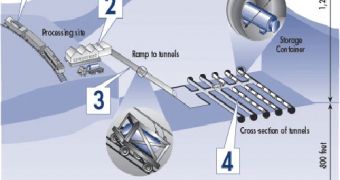The US Energy Department announced on Tuesday that the planned Yucca Mountain nuclear waste disposal site, scheduled to be fully operational by 2020, might not be large enough to hold residues that would be created until 2010, if Congress did not approve a plan to expand the facility. The report also stated that an additional disposal site might be required even if Yucca received its 300 percent increase approval, in case additional nuclear power plants were built before 2030.
"Unless Congress raises or eliminates the current statutory capacity limit of 70,000 metric tons of heavy metal, a second repository will be needed," the report read. Furthermore, the amounts of heavy metals that could be stored there could be three times as high, if Congress were to approve the expansion plan. Currently, nuclear wastes are held at 131 locations in 39 states, where they still pose a threat to the environment and to the lives of those living next to them.
The paper also said that a larger deposit would handle the country's wastes even if the existing reactors continued to run non-stop for another 60 years. However, if additional power plants are built, their combined output may be overwhelming. There aren’t many solutions staring politicians in the eye at the moment. A larger deposit means more dangers for the people of Los Angeles, where the Yucca mountain complex is located.
"We can safely store nuclear waste at existing reactor sites for the next 100 years, which will keep this toxic nuclear garbage out of the hands of terrorists and off our roads and railways where it poses a danger to more than 50 million Americans," says Nevada Democrat, Shelley Berkley, who is also a U.S. Representative.
In a statement accompanying another Energy Department report, Office of Civilian Radioactive Waste Management director, Ward Sproat, said that "The Department has concluded that, without legislation, a demonstration project accepting spent nuclear fuel from decommissioned nuclear reactor sites could not be completed in the near term and would not reduce taxpayer costs for waste disposal."

 14 DAY TRIAL //
14 DAY TRIAL //